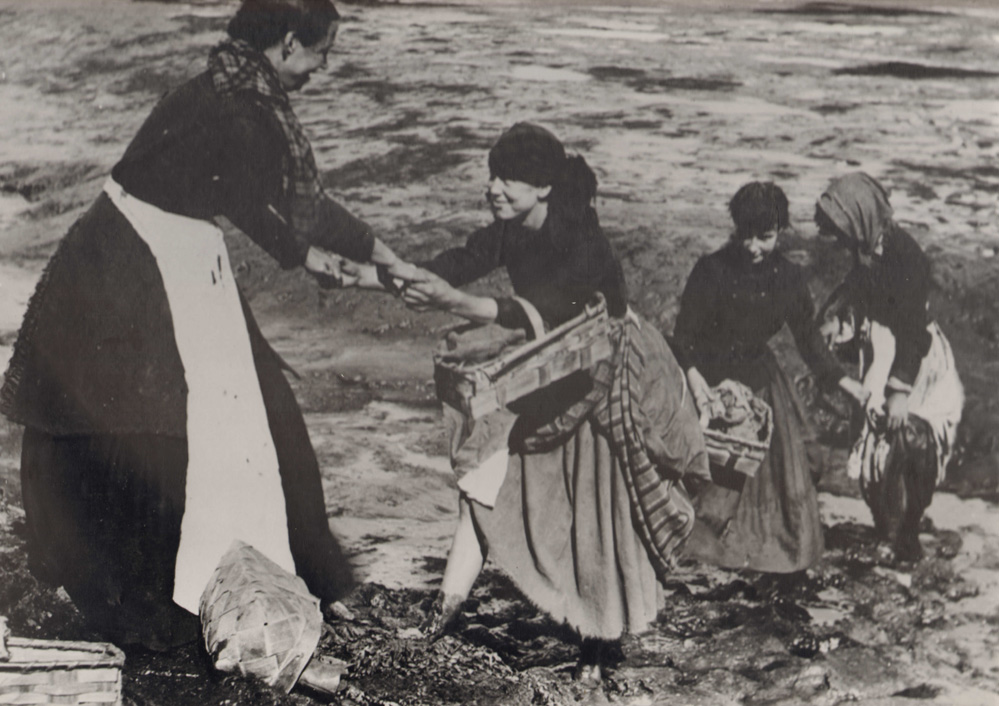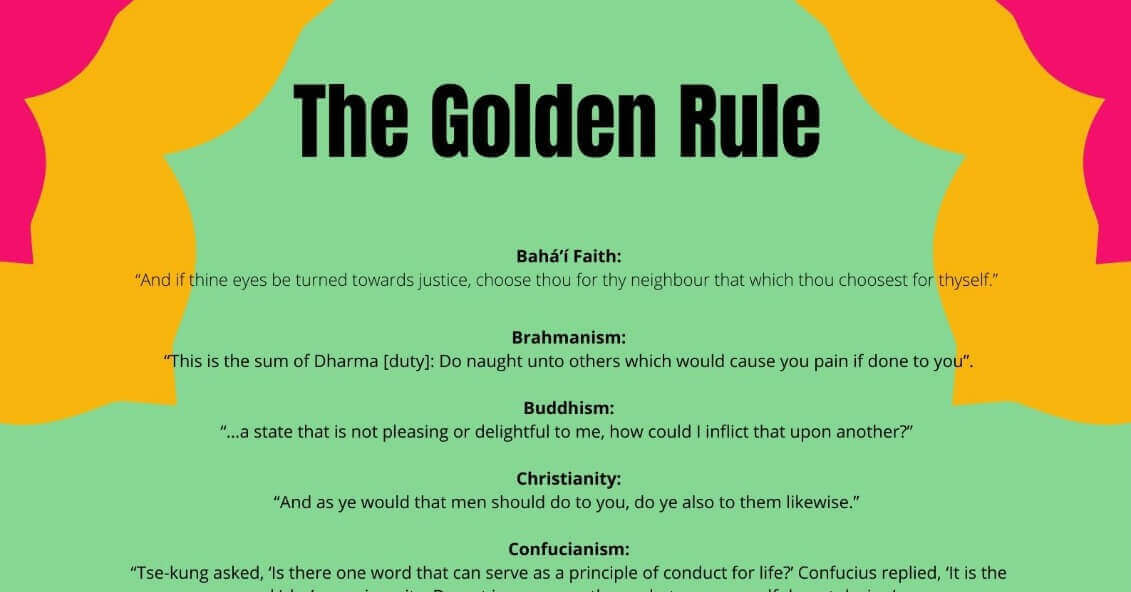The Golden Rule or Ethic of Reciprocity
What is it and why should we care?
The Golden Rule or Ethic of Reciprocity
What is it and why should we care?
The Golden Rule or Ethic of Reciprocity
What is it and why should we care?
The Golden Rule or Ethic of Reciprocity
What is it and why should we care?
The Golden Rule or Ethic of Reciprocity
What is it and why should we care?
April 5th is celebrated around the world as Golden Rule Day.
But what exactly is the Golden Rule?
And why is this belief that lies at the heart of most religions and cultures so important?
April 5th is celebrated around the world as Golden Rule Day.
But what exactly is the Golden Rule?
And why is this belief that lies at the heart of most religions and cultures so important?
April 5th is celebrated around the world as Golden Rule Day.
But what exactly is the Golden Rule?
And why is this belief that lies at the heart of most religions and cultures so important?
April 5th is celebrated around the world as Golden Rule Day.
But what exactly is the Golden Rule?
And why is this belief that lies at the heart of most religions and cultures so important?
"And if thine eyes be turned towards justice, choose thou for thy neighbour that which thou choosest for thyself."
"And if thine eyes be turned towards justice, choose thou for thy neighbour that which thou choosest for thyself."
(1)
The Golden Rule, also known as the Ethic of Reciprocity, seems, at first glance, simplicity itself. It instructs that we treat others as we’d like to be treated ourselves and, likewise, that we refrain from treating others in ways we wouldn’t like to be treated.
However, the harnessing of this type of reciprocity in our human relations is far from simple.
The Golden Rule, also known as the Ethic of Reciprocity, seems, at first glance, simplicity itself. It instructs that we treat others as we’d like to be treated ourselves and, likewise, that we refrain from treating others in ways we wouldn’t like to be treated.
However, the harnessing of this type of reciprocity in our human relations is far from simple.
The Golden Rule, also known as the Ethic of Reciprocity, seems, at first glance, simplicity itself. It instructs that we treat others as we’d like to be treated ourselves and, likewise, that we refrain from treating others in ways we wouldn’t like to be treated.
However, the harnessing of this type of reciprocity in our human relations is far from simple.
One Human Family
Before we can even look at how reciprocity works between us we need to remember that we are all interconnected. We are all leaves of one tree, waves of one ocean, flowers of one garden, all members of one human family. This isn’t a political or religious concept, it’s a biological and physical fact.
According to our genome we are undeniably ‘cousins’ and, courtesy of travel and technology, we live in a world that is becoming increasingly smaller. There are no walls or borders capable of keeping us isolated, even if we did want them to exist. The differences between us are generally illusory, at most they are skin-deep, and the measures we take as we scrabble to insulate ourselves against outside influence are like chalk lines drawn on the floor by feuding siblings sharing a bedroom. Which means that it’s in all of our interests to learn how to live together. One of the ways we can do this is to learn more about reciprocity and the elements that will make it work as a positive force to support the well-being of all.
“Regarding reciprocity and cooperation: each member of the body politic should live in the utmost comfort and welfare…if one member of the members be in distress or be afflicted with some disease all the other members must necessarily suffer. For example, a member of the human organism is the eye. If the eye should be affected that affliction would affect the whole nervous system. Hence, if a member of the body politic becomes afflicted, in reality, from the standpoint of sympathetic connection, all will share that affliction since this (one afflicted) is a member of the group of members, a part of the whole. Is it possible for one member or part to be in distress and the other members to be at ease? It is impossible!” (2)

What is Reciprocity?
The word ‘reciprocity’ is defined as –“…the practice of exchanging things with others for mutual benefit.” It has its origins in the Latin word, reciprocus, which simply means moving backwards and forwards.
From fungi growing on trees, to plovers cleaning the teeth of crocodiles, there are countless examples in the natural world of relationships that are of mutual benefit. In the human world, however, things are a bit more complex.
In its positive manifestation reciprocity is all about a bit of give and take. It’s just some mutually beneficial neighbourly behaviour where we treat each other as we would like to be treated.
But then there’s negative reciprocity…
The most obvious version of negative reciprocity manifests itself as revenge. Though most of us would agree that revenge is a pointless, destructive undertaking, most of us would have to admit that we also understand the impulse to seek vengeance. But it is an impulse we need to avoid. Recent research has suggested that 'pay-back' of any description may have even more serious consequences than we realise.
While positive reciprocal acts tend to be symmetrical and go back and forth in a predictable fashion, it seems as though negative reciprocity is not symmetrical. Rather than just swapping one hurt for another, negative situations are, in fact, inclined to escalate. Or, as researchers at the University of Chicago put it,
“You scratch my back and I’ll scratch yours, but if you take my eye, I’ll take both of yours.”(3)
This may be surprising, and it may even be slightly frightening, but in the final analysis it is helpful as it explains how many situations - from the personal to the political - get out of hand before we realise what is happening. Understanding how negative reciprocity escalates gives us a more nuanced view of issues like war, violence and injustice. It also shows us the importance of teachings like the Golden Rule.

Harnessing Reciprocity
In the Bahá’í Writings, cooperation and reciprocity are described as, “The supreme need of humanity.”(4) This assertion is explained very simply by the statement, “The stronger the ties of fellowship and solidarity amongst men, the greater will be the power of constructiveness and accomplishment in all the planes of human activity.”(5)
Reciprocity is a natural phenomenon, like electricity, and as such is full of both danger and promise. In itself it is neither good nor bad, it just depends how we use its power. As we examine this natural phenomenon it is helpful to include the current knowledge that suggests that we can’t just balance the negative reciprocity in the world with some positive reciprocal acts. It would seem that science is now agreeing with religion and suggesting it’s best to avoid negative reciprocity altogether because tit-for-tat is inclined to escalate and create even bigger problems than those that existed at the start.
Which brings us back to the Golden Rule and making sure to treat others as we ourselves would like to be treated and, equally, avoid treating them badly in any way. If we really reflect on the Golden Rule it may help us to discover how we can learn to live together. Or, as 19th century American poet, Edwin Markham put it, “We have committed the Golden Rule to memory; let us now commit it to life.”
Happy Golden Rule Day!
Some more Conversations
Some more Conversations
Some more Conversations
© 182 / 2026 | The National Spiritual Assembly of The Bahá'ís of Ireland | info@bahai.ie | (01) 6683 150 | CHY 05920 | RCN:20009724
© 182 / 2026 | The National Spiritual Assembly of The Bahá'ís of Ireland | info@bahai.ie | (01) 6683 150 | CHY 05920 | RCN:20009724
© 182 / 2026 | The National Spiritual Assembly of The Bahá'ís of Ireland | info@bahai.ie | (01) 6683 150 | CHY 05920 | RCN:20009724
© 182 / 2026 | The National Spiritual Assembly of The Bahá'ís of Ireland | info@bahai.ie | (01) 6683 150 | CHY 05920 | RCN:20009724












